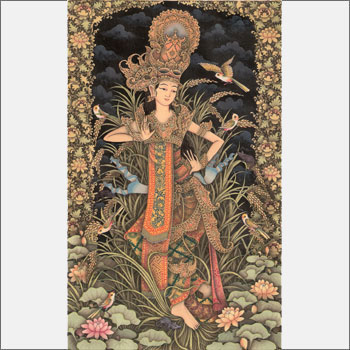 |
| Saraswati |
This has been five days of glorious sunshine, inspiring
writers and authors, book launches, and food events, all rounded off in the spirit of this year's theme of knowledge and
wisdom – Saraswati – by a huge Hindu ceremony celebrated at the Ubud temple just as the Festival got underway.
For me, the stand-out
attractions were the poetry nights. Whether it be the regular Poet’s Club at the
infamous Bar Luna or the hugely popular Poetry Slam Competition at the Betelnut Bar, poetry, with its appeal to a broad and rowdy audience, has become Ubud's rock
and roll.
Into
the Wilds, was the first event I attended. At a packed Bar
Luna, the wine flowed as percussion was played behind the fast and furious
words of the poets. Most impressive was Abraham Nouk, a former refugee, now
living in Australia. Until three years ago, Abe was illiterate, unable to read
or write. Now poetry falls out of him with the dexterity of a master wordsmith.
Notable too, was Kosal Khiev, an American in exile after serving time in a US
prison, now living in his native Phnom Penh. Having survived solitary
confinement for over a year, Khiev spits words like nails, his anger at
injustice propelling his audience into an aural maze.
These were all poets with powerful and complex stories to tell. At the subsequent Q&A, I asked why they
were attracted to poetry as opposed to other narrative forms. They told me that
it was the absence of rules that appealed; the ability to say anything at all,
unconfined by a linear and constrictive structure. If they couldn’t speak
through poetry, they said, they wouldn’t know how to live.
From perhaps a less
dramatic background, was the Singaporean poet Stephanie Dogfoot, who wowed the
audience at the Poetry Slam a couple of nights later. Her poems about
satellites and stars; and breaking free from proscriptive parents were a cornucopia
of inspiration and beauty.
Poetry is to do with liberty
and self-determination, it seems. It is the very act of telling the truth
despite the confines of your background that provokes the greatest respect from
the audience. The majority of these poets did this in spades. Those less successful
at it were the ones who seemed to be putting on an act as opposed to transposing
a reality; the lack of truth marred their work and it diminished the
power of their poems. That’s not to say they didn’t still turn on an engaging
performance – but the poems lost their emotional punch; they didn’t connect
with the audience in the same way.
Poems, like songs, have
the ability to reach in and turn on a switch in the listener. Perhaps it is
their brevity which enables this; that the words are chosen with exquisite care,
in order to stab and shock and amuse in the most impactful way.
Whatever the reason,
these poetry events are given pride of place within the Ubud
Festival’s line up. Long may they continue!






